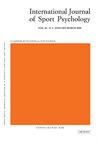体育运动中动量的心理内容和动力学的定性探索
IF 0.6
4区 心理学
Q4 HOSPITALITY, LEISURE, SPORT & TOURISM
引用次数: 39
摘要
虽然有关于心理动量(PM)的触发和结果的研究,但对PM产生和发展的动力学知之甚少。本研究通过对乒乓球和游泳比赛中PM经历的视频辅助回忆,定性地探讨了PM的触发过程、内容和随时间的发展。PM被发现是由不和谐、和谐或害怕失败的机制触发的。在项目管理的经历中,参与者报告了各种各样的感知、影响和情绪、认知和行为。人们发现,当胜利或失败被认为是不可避免的时候,PM是通过放大过程发展起来的,有时会以减少努力告终。本文结合自我调节理论和抗拒无助理论对这些发现进行了讨论。从实践的角度来看,我们建议采用基于成就目标的策略,因为我们发现掌握方法目标可以维持积极的项目管理并克服消极的项目管理。本文章由计算机程序翻译,如有差异,请以英文原文为准。
A qualitative exploration of the psychological contents and dynamics of momentum in sport
While studies on triggers and outcomes of Psychological Momentum (PM) exist, little is known about the dynamics by which PM emerges and develops over time. Based on video-assisted recalls of PM experiences in table tennis and swimming competitions, this study qualitatively explored the triggering processes, contents, and the development of PM over time. PM was found to be triggered by mechanisms of dissonance, consonance, or fear of not winning. During the PM experience, participants reported a variety of perceptions, affects and emotions, cognitions, and behaviors. PM was found to develop through processes of amplification that sometimes ended with a reduction of efforts when the victory or defeat was perceived as being inevitable. These findings are discussed in light of theories on self-regulation and reactance-helplessness. From a practical standpoint, achievement goal-based strategies are suggested, since mastery-approach goals were found to be endorsed to maintain positive PM and overcome negative PM.
求助全文
通过发布文献求助,成功后即可免费获取论文全文。
去求助
来源期刊
自引率
12.50%
发文量
0
审稿时长
>12 weeks
期刊介绍:
The International Journal of Sport Psychology publishes empirical and theoretical contributions in the human movement sciences from all over the world. Manuscripts related to psychology, sport pedagogy, exercise and sport performance are suited to the Journal''s scope.
IJSP''s aims are to disseminate results of rigorous and relevant studies, to expose positions and commentaries regarding the development of theory and confirmation or contradiction of previous findings. IJSP entertains various methodologies encompassing coherence among epistemology, research questions, tools, statistical or clinical analyses and discussion or potential applications. Qualitative and quantitative analyses as well as case studies are of interest when appropriately used. IJSP is comprised of the following sections related to human movement sciences:
-Motor learning and control
-Cognition
-Health and exercise
-Social psychology
-Intervention / Clinical / counseling psychology

 求助内容:
求助内容: 应助结果提醒方式:
应助结果提醒方式:


